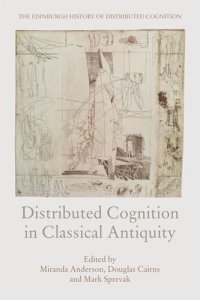
Ebook: Distributed Cognition in Classical Antiquity
Author: Miranda Anderson, Douglas Cairns, Mark Sprevak
- Year: 2022
- Publisher: Edinburgh University Press
- Language: English
- pdf
12 essays by international specialists in classical antiquity create a period-specific interdisciplinary introduction to distributed cognition and the cognitive humanities
- The first book in an ambitious 4-volume set looking at distributed cognition in the history of thought
- Includes essays on archaeology, art history, rhetoric, literature, philosophy, science, medicine and technology
- For students and scholars in classics, cognitive humanities, philosophy of mind and ancient philosophy
- Includes essays by international specialists in classics, ancient history and archaeology
This collection explores how cognition is explicitly or implicitly conceived of as distributed across brain, body and world in Greek and Roman technology, science, medicine, material culture, philosophy and literary studies.
A range of models emerge, which vary both in terms of whether cognition is just embodied or involves tools or objects in the world. As many of the texts and practices discussed have influenced Western European society and culture, this collection reveals the historical foundations of our theoretical and practical attempts to comprehend the distributed nature of human cognition.
Contributors
Miranda Anderson, University of Edinburgh, UK.
Felix Budelmann, University of Oxford, UK.
Douglas Cairns, University of Edinburgh, UK.
Christopher Gill, University of Exeter, UK.
Thomas Habinek, University of Southern California, USA.
Luuk Huitink, Heidelberg University, Germany.
George Kazantzidis, University of Patras, Greece.
David Konstan, New York University, USA.
Peter Meineck, New York University, USA.
Diana Y. Ng, University of Michigan-Dearborn, USA.
Hector Reyes, University of Southern California, USA.
Andrew M. Riggsby, University of Texas at Austin, USA.
Courtney Roby, Cornell University, USA.
William Michael Short, University of Exeter, UK.
Mark Sprevak, University of Edinburgh, UK.
Michael Wheeler, University of Stirling, UK.